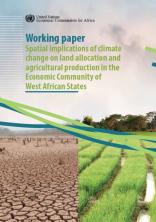Working paper Spatial implications of climate change on land allocation and agricultural production in the Economic Community of West African States

Climate change is acknowledged to be among the most serious threats to food supply systems and their capacity to meet the growing food needs of populations. Indeed, it is predicted that agriculture in the Economic Community of West African States (ECOWAS) countries will be seriously affected by climate change, but the magnitude and impact of that change will vary across landscapes. The present working paper looks at various agro-climatic zones (ACZs) and investigates the potential impact of climate change on land allocation and crop production in the ECOWAS region. The authors of the paper used a regional mathematical programming model to simulate the impact of climate change on crop acreage and crop production under two representative concentration pathways (RCPs) and four prevailing socioeconomic conditions. The findings suggest that crop acreage and production will decrease, increase or remain constant according to the type of crops cultivated and future climate and socioeconomic scenarios. The production of paddy rice, maize, sorghum, millet, oil seeds, cocoa, coffee and sesame is likely to fall in most areas as a result of both moderate and severe climate change. The magnitude and the direction of the change are expected to vary across different geographical areas. This paper, moreover, underscores the need for international action to reduce greenhouse gas emissions to ensure that populations in developing counties enjoy a higher quality of life in the years ahead, as well as the need for effective adaptation strategies to mitigate the negative effects of climate change.